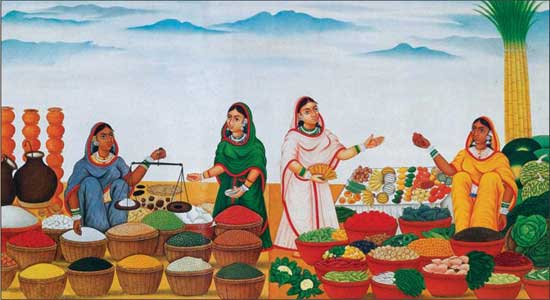City Life in South India
Translation by Alain Danielou§
The Ankle Bracelet is an ancient Tamil poem. This excerpt describes the port city of Puhar during an annual Hindu festival. Puhar was typical of the port cities of our period.§
AS YOU READ Try to visualize what the city looked and felt like.§
The Sun appeared, peering over the eastern hills. He tore off the mantle of night, spread his warm and friendly rays over the pale Earth. The sunshine lighted up the open terraces, the harbor docks, the towers with their arched windows like the eyes of deer. In various quarters of the city the homes of ![]() wealthy Greeks were seen. Near the harbor, seamen from far-off lands appeared at home. In the streets hawkers were selling unguents, bath powders, cooling oils, flowers, perfume, incense. Weavers brought their fine silks and all kinds of fabrics made of wool or cotton. There were special streets for merchants of coral, sandalwood, myrrh, jewelry, faultless pearls, pure gold and precious gems.§
wealthy Greeks were seen. Near the harbor, seamen from far-off lands appeared at home. In the streets hawkers were selling unguents, bath powders, cooling oils, flowers, perfume, incense. Weavers brought their fine silks and all kinds of fabrics made of wool or cotton. There were special streets for merchants of coral, sandalwood, myrrh, jewelry, faultless pearls, pure gold and precious gems.§
In another quarter lived grain merchants, their stocks piled up in mounds. Washermen, bakers, vintners, fishermen and dealers in salt crowded the shops, where they bought betel nuts, perfume, sheep, oil, meat and bronzes. One could see coppersmiths, carpenters, goldsmiths, tailors, shoemakers and clever craftsmen making toys out of cork or rags, and expert musicians, who demonstrated their mastery in the seven-tone scale on the flute and the harp. Workmen displayed their skills in hundreds of small crafts. Each trade had its own street in the workers’ quarter of the city.§
At the center of the city were the wide royal street, the street of temple cars, the bazaar and the main street, where rich merchants had their mansions with high towers. There was a street for priests, one for doctors, one for astrologers, one for peasants. In a wide passage lived the craftsmen who pierce gems and pearls for the jewelers. Nearby were those who make trinkets out of polished sea shells. In another quarter lived the coachmen, bards, dancers, astronomers, clowns, actresses, florists, betelsellers, servants, nadaswaram players, drummers, jugglers and acrobats.§

This 19th-century painting portrays a typical Indian food market. About 50 different items are for sale. How many can you identify?§
On the first day of spring, when the full moon is in Virgo, offerings of rice, cakes of sesame and brown sugar, meat, paddy, flowers and incense were brought by young girls, splendidly dressed, to the altar of the God who, at the bidding of Indra, king of heaven, had settled in the town to drive away all perils. As they went away from the altar, the dancers cried, “May the king and his vast empire never know famine, disease or dissension. May we be blessed with wealth—and when the season comes, with rains.”§
The people made merry on Indra’s chosen day. Great rituals were performed in the temples of the Unborn Siva, of Murugan, the beauteous god of Youth, of Valiyon, brother of Krishna, of the dark Vishnu and of Indra himself, with His strings of pearls and His victorious parasol. A festive crowd invaded the precincts of the temple, where Vedic rituals, once revealed by the God Brahma, were faultlessly performed. The four orders of the Gods, the eighteen hosts of paradise and other celestial spirits were honored and worshiped. Temples of the Jains and ![]() their charitable institutions could be seen in the city. In public squares, priests were recounting stories from the scriptures of the ancient Puranas.§
their charitable institutions could be seen in the city. In public squares, priests were recounting stories from the scriptures of the ancient Puranas.§
1. Comparing: The scenes described in this poem took place over 1,800 years ago. What are the similarities and differences between the people and activities portrayed here and those of a modern city?§
2. Analyzing: In these times, each craft or trade was the work of a separate jati. How many jatis can you identify from the crafts and trades mentioned in this poem?§
GUIDED READING §
Word Help§
Tamil§
Ancient language of South India§
Puhar§
A port city 240 kilometers south of modern Chennai§
unguent§
an ointment§
bazaar§
a large marketplace§
nadaswaram§
a high-pitched, doublereed wooden horn§
paddy§
unhusked rice§
famine§
extreme shortage of food§
parasol§
here, a highly decorated, ceremonial umbrella§
![]() Greek merchants had homes in the city of Puhar.§
Greek merchants had homes in the city of Puhar.§
Why do you think they were wealthy?§
![]() The city had both Hindu and Jain temples.§
The city had both Hindu and Jain temples.§
How does this show religious tolerance on the part of the citizens?§

